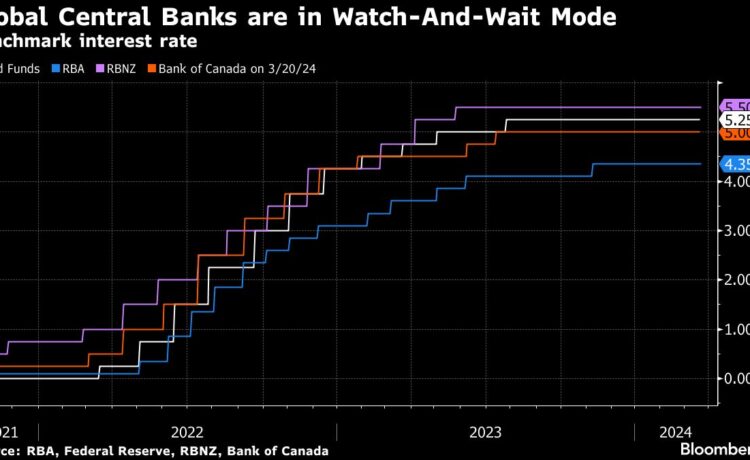(Bloomberg) — Australian employment soared last month and the jobless rate declined, highlighting the ongoing resilience of the nation’s labor market to restrictive monetary policy. The currency and bond yields advanced.
Most Read from Bloomberg
Traders pared back expectations for an August interest-rate cut after government data Thursday showed the economy added 116,500 roles, almost three times the 40,000 gain forecast. Unemployment fell to 3.7% in February from 4.1% in the prior month.
“These data clearly challenge the view that monetary policy is providing enough of a drag on the economy to bring down wage growth and inflation,” said Ben Udy, lead economist for Oxford Economics Australia. The Reserve Bank will be watching closely “from here to see if the loosening in the labor market resumes.”
The currency rose as much as 0.6% after the data while yields on the policy-sensitive three-year government bond climbed to 3.7%. Traders now see a 60% chance of a rate cut in August, down from 80% before the data.
The strong jobs data contrasts with indicators ranging from business and consumer surveys to job vacancies and retail sales that suggest the economy is slowing. The RBA this week abandoned its hiking bias after leaving the key rate at a 12-year high of 4.35% as it seeks clarity on the trajectory of the economy.
Australia’s Employment Minister Tony Burke said the report showed it’s possible to bring inflation down while keeping the jobless rate low.
First-quarter inflation is due next month, with economists expecting it will be weaker than the 4.1% reading for the final three months of 2023. The RBA’s latest forecasts show inflation only returning to its 2-3% target in late 2025.
“We want a situation where inflation is going down, wages are going up, employment’s going up and unemployment’s low. At the moment we’re getting all four,” Burke told reporters in Canberra on Thursday.
Australia’s jobs figures come after data earlier Thursday showed neighboring New Zealand tipped into a double-dip recession in the face of aggressive monetary policy tightening. That’s despite its tight labor market, with a jobless rate of 4%.
Read more: New Zealand Economy Unexpectedly Shrinks, Entering Recession
The Australian Bureau of Statistics pointed out that February’s sharp gain came after a large number of people in the prior two months had reported they were waiting to start or return to a job. That translated into a bigger-than-usual flow of people into employment in February.
What Bloomberg Economics Says…
“The blowout reading on Australia’s February job growth is unlikely to stand the test of time. We don’t think the labor market behaved the way the estimated employment figures suggests, particularly against the backdrop of weak demand and sustained declines in job ads”
— James McIntyre, economist.
For the full note, click here
Despite the jump in hiring in February, annual jobs growth cooled to 3.2% from 3.5% a year earlier and both economists and policy makers expect the slowdown to extend. The RBA — which characterizes the labor market as still a bit tight — expects the jobless rate to reach 4.4% by mid-2025.
“The strength in the labor market indicates that there is no pressing need right now to cut rates,” said Diana Mousina, deputy chief economist at AMP Ltd.
“Based on the leading indicators of jobs growth, we think the labor market will deteriorate,” she said. “The RBA will need to cut rates by around mid-year but there is a risk that this gets pushed to August or September if the economic data continues to hold up.”
Thursday’s labor data also showed:
-
Underemployment edged down to 6.6% and the underutilization fell to 10.3% from 10.8%
-
The economy added 78,200 full-time roles and 38,300 part-time
-
The participation rate edged down to 66.7%.
-
The employment to population ratio increased to 64.2%
-
Monthly hours worked rose by 2.8%
–With assistance from Matthew Burgess and Ben Westcott.
(Updates market reaction, adds comments from employment minister, Bloomberg Economics.)
Most Read from Bloomberg Businessweek
©2024 Bloomberg L.P.




